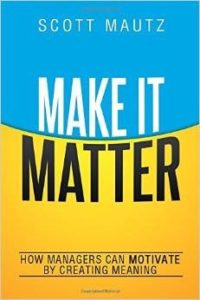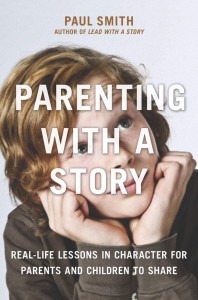Podcast: Play in new window | Download | Embed
Subscribe: RSS
Podcast (parenting-with-a-story-podcast-series): Play in new window | Download | Embed
Subscribe: RSS
 Being kind to strangers is a good start. But far more impactful is being kind to the people we know and see every day. In fact, if you were to ask someone who’s been on the receiving end of unkindness, odds are it didn’t come from a stranger. It came from a classmate, a coworker, or a friend. Just ask Scott Mautz.
Being kind to strangers is a good start. But far more impactful is being kind to the people we know and see every day. In fact, if you were to ask someone who’s been on the receiving end of unkindness, odds are it didn’t come from a stranger. It came from a classmate, a coworker, or a friend. Just ask Scott Mautz.
Scott was born with muscular dystrophy. . .
a degenerative disease that attacks the skeletal muscles. And that was complicated by a noticeable case of scoliosis, or curvature of the back, which often accompanies MD.
Today, in his forties, he still walks a little funny. He describes his gait as “looking like I’ve been riding a horse for two days.” But when he was a child it was a much more debilitating condition. He wore a full body brace including a collar around the neck and thick spinal support down his back. His nickname at school was “Mr. Twister” because of the awkward gyrations he had to go through with every step.
Not surprisingly, he wasn’t athletic enough to play varsity sports at his high school in Syracuse, New York. But he still wanted to be part of the team and hang out with the athletes and the “cool kids” one way or another. So he volunteered to be the team manager. That meant he got the towels, carried the water, and corralled the equipment. Combined with an impeccable sense of humor, this kept him in the good graces (and in the company) of the popular crowd.
But the natural cruelty of teenagers and his humblingly visible disability were too much for that to last. Eventually, his luck ran out. “One day at lunch,” he said, “somebody decided it was uncool to be friends with me.” Within a matter of minutes, everyone at the table turned on him. “I was suddenly conscious that I was a bit of a freak and that I wasn’t welcome there anymore.”
The walk of shame
Words are probably inadequate to describe the sobering moment Scott was to face next. He knew what he had to do. “I had to stand up, pick up my tray, and leave.” Tray in hand, he desperately scanned the cafeteria for an empty seat and a welcoming gaze. He found only one, the one everyone else would know as the “nerd” table.
There were no athletes there. Most of the kids were either overweight or underweight, spent their time playing Dungeons & Dragons, and had terrible acne. But since sitting anywhere was more appealing than sitting alone, Scott started off in their direction. In that one cathartic moment he crossed physical as well as social and emotional thresholds. He felt every eye on him as he took the long walk of shame, “twisting” past all the boys he looked up to and the girls he had crushes on. The entire scene is seared in Scott’s memory: the color of his tray, what he had for lunch, the looks on the faces as he moved to the only table that would accept him.
Scott recalls the awkwardness of having to sit down and make friends with the very people he had participated in teasing with his former friends until only moments before. He remembers openly mocking and teasing one of the boys in particular only a few weeks earlier. “But they accepted me. They never asked me why I was sitting there. Never said one word about it. They just took me in.” And about the boy he had teased? “I remember thinking, ’THIS is the coolest kid in school!’”
How did this humbling experience impact Scott? “It changed me forever. I was never that unkind to anyone again. And I’m sure it shaped much of who I am as an adult.”
How he turned out, 30 years later
 I have to agree with Scott on that one. That same Scott Mautz grew up to become a very successful marketing director for Procter & Gamble, the largest marketer of consumer products in the world. More to the point, he’s also the author of a new book: Make it Matter: How Managers Can Motivate by Creating Meaning, a book to teach bosses everywhere how to treat people in a way that will make their work meaningful again, therefore bringing out the best in them.
I have to agree with Scott on that one. That same Scott Mautz grew up to become a very successful marketing director for Procter & Gamble, the largest marketer of consumer products in the world. More to the point, he’s also the author of a new book: Make it Matter: How Managers Can Motivate by Creating Meaning, a book to teach bosses everywhere how to treat people in a way that will make their work meaningful again, therefore bringing out the best in them.
The lesson
As a child or an adult, the lesson I take from Scott’s story is this: Resolve to be kind to everyone you meet, because none of us are ever that far from the nerd table.
Now, as with all these stories, I encourage you to share this with your kids, and then have a discussion about it. Here are some questions to get you started. . .
- If you were a student at Scott’s high school, at which of those tables would you likely sit?
- Do you think Scott regretted teasing those other kids after he ended up turning to them for friendship?
- Who are some of the people at your school that get teased and made fun of? How do you feel when you see that happen?
- What should you do when you see other people making fun of someone?
[You can find this and over 100 other character-building stories in my book, Parenting with a Story.]
—
 Paul Smith is a one of the world’s leading experts on business storytelling. He’s a keynote speaker, storytelling coach, and bestselling author of the books Lead with a Story and Parenting with a Story.
Paul Smith is a one of the world’s leading experts on business storytelling. He’s a keynote speaker, storytelling coach, and bestselling author of the books Lead with a Story and Parenting with a Story.

 Connect with him via email here.
Connect with him via email here.
Follow him on Facebook, LinkedIn, Twitter.
Sign up for his newsletter here to get one new story a week delivered to your inbox.


As someone who sat at the nerd table in middle school & who was bullied unmercifully, wow do I resonate. Going through this experience is one of the reasons I have so much compassion and share kindness with everyone. Always remembering that every living creature deserves love and kindness and caring. Thanks for sharing Scott’s story, powerful.